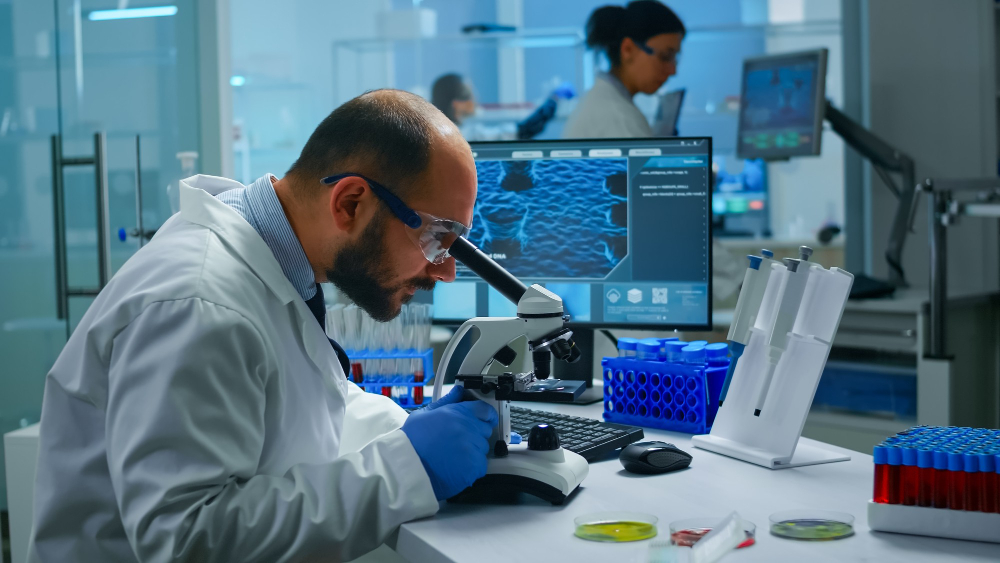Introduction
Artificial intelligence (AI) is a rapidly evolving field that has the potential to revolutionize various aspects of human society, including scientific research. AI refers to the ability of machines to perform tasks that normally require human intelligence, such as reasoning, learning, and problem-solving. AI can augment and enhance the capabilities of human researchers, enabling them to discover new phenomena, test hypotheses, and generate knowledge.

In this article, we will explore how AI is transforming scientific research, from experimental design and optimization to data analysis and interpretation, to hypothesis generation and testing, to cross-disciplinary collaboration. We will also highlight some of the case studies where AI has led to significant scientific breakthroughs, as well as discuss some of the challenges and ethical considerations that arise from the growing role of AI in scientific discovery.
AI in Experimental Design and Optimization
One of the ways that AI is transforming scientific research is by leveraging its power for designing experiments and optimizing parameters. Traditionally, scientists have relied on manual methods and intuition to design experiments, which can be time-consuming, costly, and prone to errors. AI can automate and optimize the process of experimental design, by using algorithms that can search for the optimal combination of variables, conditions, and methods that can yield the desired outcomes.
For example, AI can help researchers design experiments for synthesizing new materials, by predicting the properties and behaviors of different combinations of elements and compounds. AI can also help researchers optimize the parameters of experiments, such as temperature, pressure, and duration, by using feedback loops and reinforcement learning to adjust them in real-time. By reducing the trial-and-error processes and improving the efficiency and reproducibility of scientific experimentation, AI can accelerate the discovery of new phenomena and solutions.
AI in Data Analysis and Interpretation
Another way that AI is transforming scientific research is by utilizing its capabilities for data analysis and interpretation. Modern science generates massive amounts of data, which can be difficult to process, analyze, and interpret by human researchers. AI can help researchers handle large and complex datasets, by using machine learning algorithms that can learn from data, identify patterns, and make predictions.
For example, AI can help researchers analyze data from various sources, such as images, videos, texts, and sensors, by using techniques such as computer vision, natural language processing, and signal processing. AI can also help researchers interpret data, by using techniques such as statistical inference, causal inference, and explainable AI. By enhancing the accuracy and reliability of data analysis and interpretation, AI can enable researchers to extract insights and generate knowledge from data.
AI in Hypothesis Generation and Testing
A third way that AI is transforming scientific research is by enabling its abilities for hypothesis generation and testing. Traditionally, scientists have relied on human creativity and intuition to generate hypotheses, which can be limited by existing knowledge and biases. AI can augment and enhance the process of hypothesis generation, by using data-driven insights and computational models to generate novel and plausible hypotheses.
For example, AI can help researchers generate hypotheses for explaining the causes and effects of various phenomena, by using techniques such as causal discovery, abductive reasoning, and counterfactual reasoning. AI can also help researchers test hypotheses, by using techniques such as automated experimentation, simulation, and verification. By facilitating the iterative refinement of scientific hypotheses, AI can foster the advancement of scientific theories and understanding.
AI in Cross-disciplinary Collaboration
A fourth way that AI is transforming scientific research is by bridging the gaps between different scientific disciplines. Traditionally, scientists have worked within their own domains and silos, which can limit the scope and impact of their research. AI can facilitate the cross-disciplinary collaboration among researchers, by enabling the integration and synthesis of knowledge and methods from various fields.

For example, AI can help researchers collaborate across disciplines such as biology, chemistry, and physics, by using techniques such as knowledge representation, ontology alignment, and semantic web. AI can also help researchers share and communicate their findings and ideas, by using techniques such as natural language generation, data visualization, and interactive dialogue. By encouraging the interdisciplinary approaches to solving complex scientific problems, AI can foster the innovation and discovery of new solutions and applications.
Case Studies: Examples of AI-Driven Discoveries
To illustrate the transformative impact of AI in scientific research, we will highlight some of the case studies where AI has led to significant scientific breakthroughs. These are just a few examples of the many success stories across various fields where AI has enabled researchers to achieve remarkable results.
- In biology, AI has helped researchers discover new antibiotics, by using deep learning to screen millions of chemical compounds and identify potential candidates that can kill bacteria. AI has also helped researchers discover new genes, by using machine learning to analyze genomic data and identify novel sequences and functions.
- In chemistry, AI has helped researchers discover new materials, by using generative models to design and synthesize new molecules and structures. AI has also helped researchers discover new reactions, by using reinforcement learning to optimize the conditions and outcomes of chemical reactions.
- In physics, AI has helped researchers discover new particles, by using neural networks to analyze data from particle colliders and identify rare and exotic events. AI has also helped researchers discover new phases of matter, by using unsupervised learning to classify and characterize different states of matter.
Challenges and Ethical Considerations
While AI has the potential to transform scientific research, it also poses some challenges and ethical considerations that need to be addressed. As AI becomes more integrated and influential in scientific discovery, it is important to ensure that it is aligned with the values and principles of science, such as objectivity, transparency, and accountability.
Some of the challenges and ethical considerations that arise from the growing role of AI in scientific research are:
- Addressing biases and ensuring transparency in AI-driven research. AI systems can inherit or introduce biases in the data, algorithms, and outcomes of scientific research, which can affect the validity and reliability of the results. It is important to identify and mitigate the sources and effects of biases, and to ensure that the assumptions, methods, and limitations of AI-driven research are transparent and understandable.
- Ethical implications of AI’s role in scientific discovery. AI systems can have significant impacts on the society and the environment, both positive and negative, depending on the goals, applications, and outcomes of scientific research. It is important to consider the ethical implications of AI’s role in scientific discovery, and to ensure that it is used for the benefit of humanity and the planet, and not for harm or exploitation.
- Balancing the benefits of AI with potential risks and limitations. AI systems can augment and enhance the capabilities of human researchers, but they cannot replace them. AI systems have limitations and uncertainties, and they may not always produce accurate or optimal results. It is important to balance the benefits of AI with potential risks and limitations, and to maintain the human oversight and involvement in scientific research.
Future Outlook and Opportunities
As AI continues to evolve and improve, it will offer more opportunities and possibilities for scientific research. AI will enable researchers to explore new domains and frontiers, to discover new phenomena and solutions, and to generate new knowledge and understanding. AI will also enable researchers to collaborate and communicate more effectively, to share and integrate knowledge and methods, and to solve complex and interdisciplinary problems.
Some of the predictions and trends that will shape the future of AI-driven science are:
- Continued integration of AI in scientific research. AI will become more ubiquitous and pervasive in scientific research, as more researchers adopt and utilize AI-driven approaches and tools. AI will also become more specialized and customized, as more AI systems are developed and tailored for specific scientific domains and tasks.
- Emerging technologies and methods shaping the future of AI-driven science. AI will leverage and incorporate emerging technologies and methods, such as quantum computing, neuromorphic computing, and federated learning, to enhance its performance and capabilities. AI will also develop and innovate new technologies and methods, such as generative adversarial networks, meta-learning, and self-learning, to expand its potential and scope.
- Potential for AI to democratize access to scientific tools and knowledge. AI will lower the barriers and costs of scientific research, by providing more accessible and affordable tools and resources for researchers. AI will also increase the participation and engagement of the public and the stakeholders in scientific research, by providing more interactive and inclusive platforms and channels for communication and collaboration.
Conclusion
AI is transforming scientific research, by augmenting and enhancing the capabilities of human researchers, enabling them to discover new phenomena, test hypotheses, and generate knowledge. AI is transforming scientific research, by leveraging its power for designing experiments and optimizing parameters, by utilizing its capabilities for data analysis and interpretation, by enabling its abilities for hypothesis generation and testing, and by bridging the gaps between different scientific disciplines. AI is transforming scientific research, by leading to significant scientific breakthroughs, by posing challenges and ethical considerations, and by offering future opportunities and possibilities.
AI is revolutionizing the scientific landscape, by accelerating the pace and impact of scientific discovery. AI is revolutionizing the scientific landscape, by fostering the innovation and creativity of scientific research. AI is revolutionizing the scientific landscape, by creating a future where science is more efficient, reliable, and collaborative.
